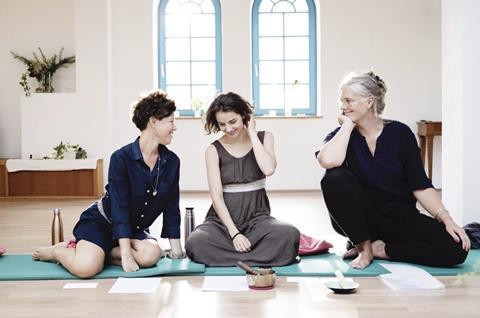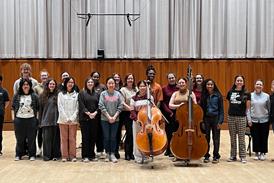Emma Baird speaks to violinist Alina Pogostkina about revolutionising current approaches to high-level classical music training, and how to play with more freedom, honesty and depth of expression

‘The message I wish to contribute to the musical world is that we can create a different reality. We can be more in connection with ourselves and others, and create a more benevolent environment.’
Violinist Alina Pogostkina describes her musical upbringing as unnatural and unhealthy: ‘all of my life had been filled with huge pressure. I studied first with my father, who was very strict and completely focused on the violin. This was followed by entering into a university system and also not feeling like I had the space to be a human being. I grew up as a child prodigy, performing from the age of five, and playing solos with orchestra from the age of seven.
’I had to function like this from such a young age, so I learned very early on to suppress my emotions. I grew up being very disassociated. There was a split in my personality: the good girl on stage, and then all of the pain that I chose to disassociate from because it didn’t serve the functioning part of me.’
Alina also detects a similar process happening on a wider scale, in music schools and society in general: ‘we are born completely unique and perfect the way we are. We don’t question ourselves as babies, and then we are taught by caregivers, teachers or parents and put into a system where people can compare us. That is where we start to contract.’
She continues, ’We learn, subconsciously as children, “I’m not good enough”, and ”I need to work hard to reach the goals that others have for me because that’s what I’m supposed to do”. This is a dangerous path that we walk, as a society in general. Rather than considering how we can support the child or student unfold, we try to force it into a particular shape, or idea which we think is “right”. This pressure prevents it from turning into the most authentic and fully expressed version of itself.’
This suggests, to a certain extent, that there is a counterproductive and perhaps damaging aspect to the current systems of schooling and classical training: if we are always thinking critically and analysing what we do, surely - at some point - that becomes counterproductive because it disrupts a natural state of flow. Alina agrees, and says ‘connecting with emotion, intuition and creativity…none of that can happen if we try to squeeze ourselves into a certain way of being, doing, achieving, and competing. This closes down all of the sensitive receptivity and emotional intelligence that we have.’
Read: The Power of a Performance Psychologist
Listen: The Strad Podcast #13: Dr. Renée-Paule Gauthier on dealing with performance anxiety
Yet, the process of learning a musical instrument must involve a certain degree of pressure, discipline and hard work. The question is, how does one maintain and protect an authentic voice amidst this pressure? This is something that Alina wishes to address through her ‘heart project’, Mindful Music Making.
She says ‘ I wanted to create a holistic approach which dealt with the whole musician, addressing the technical and musical aspects, of course, but also the emotions, mindset and physicality. By chance, I met two amazing women – Leonie Von Arnim and Susanne Feld. Both are therapists, but Susanne is also a musician and teaches Alexander Technique. We came together and started our business in 2018.’
Part of this holistic approach involves detecting and then removing barriers to flow, freedom and the enjoyment of playing. Alina explains ‘when people say to me ‘I want to find more joy’, or ‘access more flow’, we must ask what is keeping them from being in complete connection with themself; their body; the music; the audience. You cannot just press a button and suddenly be in flow state.’
She concludes, ’These blockages are usually linked to the past: to fears and coping mechanisms in our system designed to keep us safe. This is actually a very contracted state to be in, where we can’t access flow, creativity or expansion. It is a deep exploration of that person, to find out how they can develop into a state where they feel safer with themselves.’
Mindful Music Making is offering several events throughout May, including an online programme ‘community experience’ and a two day workshop on non violent communication.
Find out more on the MMM website here.











































No comments yet